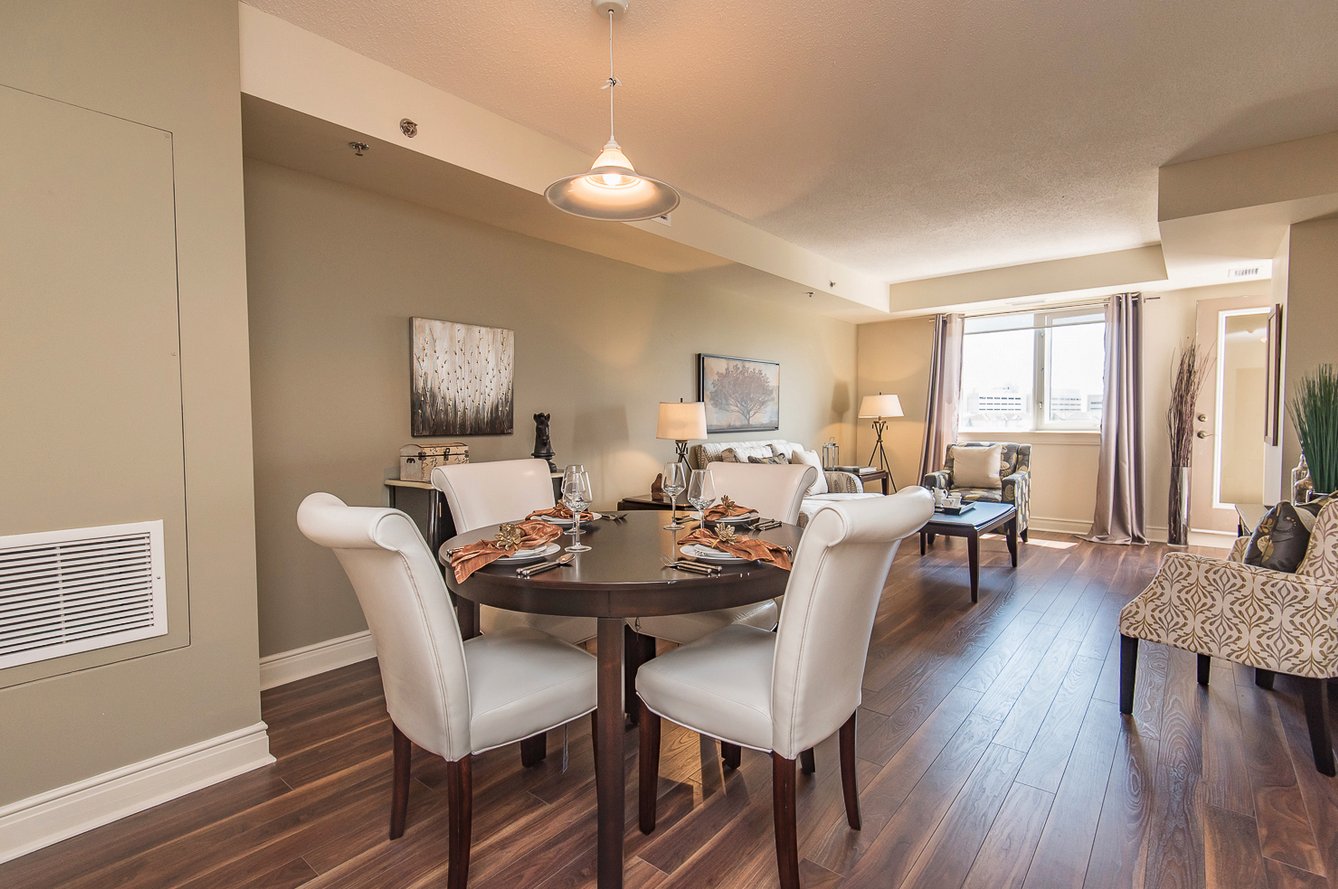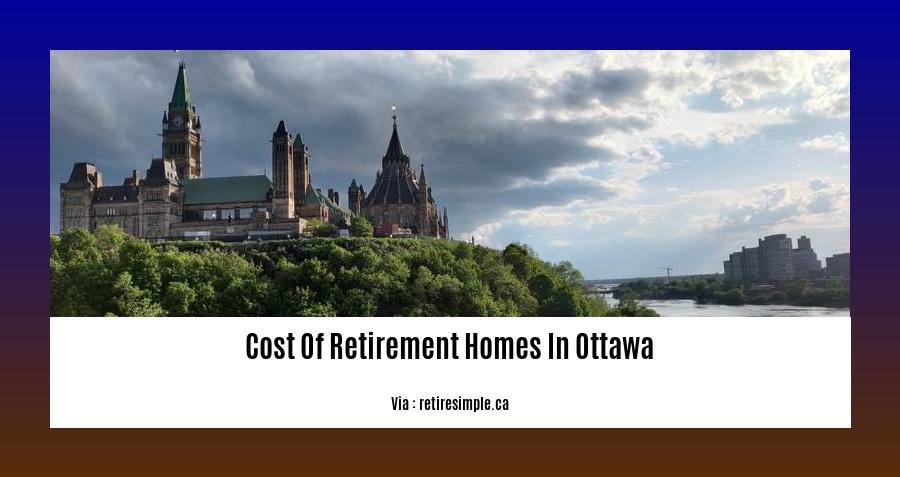[- Unraveling the Cost of Retirement Homes in Ottawa: A Comprehensive Guide for Informed Decisions]: Navigating the complexities of senior living options in Ottawa can be a daunting task, especially when it comes to understanding the costs associated with retirement homes. This comprehensive guide delves into the factors influencing these costs, providing invaluable insights to empower individuals and families in making informed decisions about their retirement housing options. From analyzing location and amenities to exploring levels of care and financial considerations, this article equips readers with the knowledge needed to navigate the landscape of retirement homes in Ottawa.
Key Takeaways:
-
The average retirement home cost in Ottawa ranges from $1,765 to $5,741 per month.
-
Senior care costs $29/hour in Ottawa.
-
One person pays an average of $3,500 per month for a retirement home in Ottawa.
-
Ottawa retirement home costs vary based on location, accommodation, and chosen services.
-
Ottawa retirees can expect to pay between $3,000 and $6,000 monthly to reside in a retirement home.
Cost of Retirement Homes in Ottawa

Navigating the cost of retirement homes in Ottawa can be daunting, but understanding the factors that influence pricing can help you make informed decisions.
Factors Affecting Retirement Home Costs
-
Location: Retirement homes in sought-after urban areas tend to have higher costs compared to rural or suburban areas.
-
Type of Home: Different types cater to varying needs and offer distinct amenities, impacting cost.
-
Room Size and Amenities: More prominent rooms, private bathrooms, and additional services can increase the cost.
-
Level of Care: Higher levels, like 24-hour nursing assistance or specialized care, come with a higher price tag.
Types of Retirement Homes
-
Independent Living: Designed for seniors who are relatively independent and require minimal assistance.
-
Assisted Living: Suitable for seniors who need help with daily tasks like bathing, dressing, and medication management.
-
Memory Care: Specialized facilities catered towards individuals with dementia or Alzheimer’s, offering dedicated support.
Financial Assistance
-
Government Subsidies: Programs like Ontario Seniors’ Dental Care provide financial aid to eligible individuals.
-
Private Insurance: Long-term care insurance policies can help offset retirement home expenses.
-
Reverse Mortgages: This financial tool allows homeowners to borrow against their home equity to fund retirement expenses.
Conclusion
Understanding these factors can help you navigate the cost of retirement homes in Ottawa. Research, compare costs, and consider your needs to make an informed decision about your retirement living arrangements.
The average cost of prefab homes in Ontario is significantly lower than that of traditional homes, making them an appealing choice for many homeowners.
In the United Kingdom, prefab homes are gaining popularity due to their affordability and quick construction time.
If you’re considering building a tiny home in Texas, it’s important to be aware of the costs involved before you begin the process.
Government subsidies, private insurance, and reverse mortgages are potential financial assistance options for retirement home costs.
Retirement homes in Ottawa offer seniors a supportive environment, but their costs can vary. Let’s break down the factors that affect pricing and explore available financial assistance options.
Factors Affecting Retirement Home Costs in Ottawa:
- Location Matters: Urban areas tend to have higher costs compared to rural or suburban areas.
- Types of Homes: Facilities differ in amenities and services, influencing costs.
- Room Size and Amenities: Bigger rooms and private bathrooms mean higher costs.
- Level of Care: Elevated care, such as 24-hour nursing assistance, comes at a premium.
Types of Retirement Homes in Ottawa:
- Independent Living: Designed for seniors with minimal assistance requirements.
- Assisted Living: Offers support with daily tasks like bathing, dressing, and medication management.
- Memory Care: Specialized facilities providing dedicated care for individuals with dementia or Alzheimer’s.
Navigating Financial Assistance Options:
- Government Subsidies: Look into programs like Ontario Seniors’ Dental Care and Assistive Devices Program.
- Private Insurance: Consider long-term care insurance to offset retirement home expenses.
- Reverse Mortgages: Tap into your home equity to fund retirement living costs.
Key Takeaways:
- Retirement home costs depend on location, type, room size, amenities, and level of care.
- Explore financial assistance options like government subsidies, private insurance, and reverse mortgages.
- Compare costs and consider individual needs and priorities to make informed decisions.
Sources:
1. State Intervention in Reverse Mortgages: Legal Framework and Subsidies
2. Reverse Mortgages, Financial Inclusion, and Economic Development
Understanding these factors and exploring financial assistance options can aid individuals and families in making informed decisions about retirement living arrangements.

Navigating the world of retirement living can be confusing and daunting, particularly regarding costs. But with a well-informed approach, you can make decisions that fit your circumstances, preferences, and financial realities.
Key Takeaways:
- Factors to Consider: Geography, type of retirement home, level of care, additional services, and amenities all influence costs.
- Types of Retirement Homes: Independent, assisted living, and specialized memory care facilities.
- Financial Assistance: Options include government subsidies, private insurance, and reverse mortgages.
Factors Shaping Retirement Home Costs in Ottawa:
-
Location Matters: Within Ottawa, urban areas tend to have higher price tags than rural or suburban regions.
-
Types of Retirement Homes: Costs vary across three common categories – independent living, assisted living, and specialized memory care.
-
Room Size and Amenities: Retirement homes typically offer a spectrum of room sizes, configurations, and amenities, each with its unique cost.
-
Level of Care: Homes with higher levels of care, including 24/7 nursing services, often come with higher costs.
-
Additional Services: Optional services like meals, laundry, transportation, and social activities add to the overall costs.
Financial Assistance: Navigating the Options
-
Government Subsidies: Ontario programs like the Seniors’ Dental Care Program and the Assistive Devices Program can provide invaluable financial support.
-
Private Insurance: Long-term care insurance policies offer a safety net against retirement home expenses.
-
Reverse Mortgages: This financial tool allows homeowners to access home equity, a potential source of funds for retirement housing.
Deciding on a retirement home involves more than just financial considerations – it’s about finding a harmonious blend of comfort, care, and affordability. By understanding these factors and exploring financial assistance options, you’re making informed decisions to ensure your retirement journey is as fulfilling as possible.
[Sources]
1. Understanding the Cost of Retirement Homes in Ottawa: A Guiding Framework
2. Retirement Homes Ottawa: Cost, Types, and Financial Assistance
Research, Cost Comparison, and Consideration of Individual Needs and Preferences Are Crucial When Choosing a Retirement Home
Understanding the Cost of Retirement Homes in Ottawa: A Comprehensive Guide for Informed Decisions
Navigating retirement home options can be overwhelming with the array of choices available. Research, cost comparison, and consideration of individual needs and preferences are the key factors to making an informed decision that ensures seniors find a comfortable and suitable living arrangement. Let’s delve into each factor in detail:
Location
The cost of retirement homes is closely tied to their location. Urban areas like downtown Ottawa tend to have higher housing prices compared to suburban or rural areas. Weigh the pros and cons of each location, considering factors such as proximity to family, friends, and essential services.
Types of Retirement Homes
Ottawa offers a range of retirement home options, each with distinct levels of care and amenities:
-
Independent Living: Designed for seniors who are relatively self-sufficient. This option offers a social and active lifestyle with minimal assistance.
-
Assisted Living: Ideal for seniors needing help with daily activities like bathing, dressing, medication management, and meals.
-
Memory Care: Specialized facilities equipped to provide care for individuals with dementia or Alzheimer’s disease.
The type of home you choose will significantly impact the cost. Independent living is generally the most affordable, while memory care facilities tend to have higher fees due to specialized care services.
Room Options
Within retirement homes, room options vary in size, amenities, and services. A private room with an ensuite bathroom will naturally cost more than a shared room. Consider the level of privacy, space, and amenities that align with your needs and preferences.
Level of Care
The level of care required directly influences the cost. Higher levels of care, such as 24-hour nursing assistance, specialized medical services, and medication management, come with a higher price tag. Assess your current and future care needs to determine the appropriate level of care.
Additional Services and Amenities
Retirement homes often offer a range of additional services and amenities that can add to the overall cost. These may include meals, laundry, transportation, social activities, and fitness facilities. Carefully review the inclusions and exclusions to ensure you’re only paying for services you truly value.
Government Subsidies and Financial Assistance
Several government subsidies and financial assistance programs are available to help offset the cost of retirement homes. Explore programs like the Ontario Seniors’ Dental Care Program and the Assistive Devices Program. Additionally, certain long-term care insurance policies may cover a portion of retirement home expenses.
Key Takeaways:
- Research: Gather information about retirement homes in Ottawa, including their location, types of care, room options, level of care, and additional services.
- Cost Comparison: Compare the costs of different retirement homes to find the one that fits your budget and needs.
- Individual Needs and Preferences: Consider your current and future health needs, personal preferences, and lifestyle choices when making a decision.
Relevant URL Sources:
[1] https://www.ontario.ca/page/retirement-homes
[2]
FAQ
Q1: What factors influence the cost of retirement homes in Ottawa?
A1: The cost of retirement homes in Ottawa is influenced by several factors, including the location of the community, the type of accommodation, the level of care and services required, and the amenities offered.
Q2: What is the average cost of a retirement home in Ottawa?
A2: The average cost of a retirement home in Ottawa is approximately $3,500 per month for a single person. However, this cost can vary depending on the factors mentioned above.
Q3: Are there any financial assistance options available for seniors seeking retirement homes in Ottawa?
A3: There are several financial assistance options available for seniors seeking retirement homes in Ottawa, such as government subsidies, tax credits, and reverse mortgages.
Q4: What is a reverse mortgage, and how can it help seniors access retirement housing?
A4: A reverse mortgage is a loan that allows seniors to borrow money against the equity in their homes. This loan can be used to cover the cost of retirement housing or other expenses.
Q5: What are some tips for choosing the right retirement home in Ottawa?
A5: When choosing a retirement home in Ottawa, it’s essential to consider factors such as the location, amenities, level of care, and cost. It’s also important to visit the retirement home in person and ask questions about the services and care provided.
- The Best Battery Picture Lamps for Effortless Artwork Illumination - April 1, 2025
- Double Sink Bath Vanity Tops: A Buyer’s Guide - April 1, 2025
- Bath Towel Measurements: A Complete Guide to Choosing the Right Size - April 1, 2025










